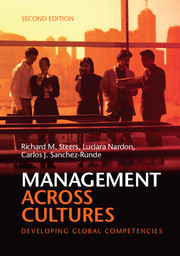Book contents
- Frontmatter
- Contents
- List of exhibits
- Guided Tour
- Introduction
- Part I Challenges for Global Managers
- Part II Developing Global Understanding
- Part III Developing Global Management Skills
- 6 Communicating across cultures
- 7 Negotiating global agreements
- 8 Leading global organizations
- 9 Managing a global workforce
- 10 Working with global teams
- 11 Living and working globally
- 12 Epilogue: the journey continues
- Appendix Models of national cultures
- Name and company index
- Subject index
- References
8 - Leading global organizations
from Part III - Developing Global Management Skills
- Frontmatter
- Contents
- List of exhibits
- Guided Tour
- Introduction
- Part I Challenges for Global Managers
- Part II Developing Global Understanding
- Part III Developing Global Management Skills
- 6 Communicating across cultures
- 7 Negotiating global agreements
- 8 Leading global organizations
- 9 Managing a global workforce
- 10 Working with global teams
- 11 Living and working globally
- 12 Epilogue: the journey continues
- Appendix Models of national cultures
- Name and company index
- Subject index
- References
Summary
Management challenge
More books have been written about leadership than any other topic in management, yet we still know very little about how or why leadership efforts succeed or fail. In addition, we know even less about how to train leaders, global or otherwise, despite the innumerable proffered training programs available. One thing is clear, however. Leadership is not a quality or skill that can be replicated around the world. In other words, leadership in India or China is based on fundamentally different traditions and assumptions from those in England or France, and these differences cannot be ignored. As a result, the challenge for global managers is to develop a sensitivity and understanding of how leadership efforts play out across countries and cultures, as well as how to behave when placed in or near such responsibilities. We explore this topic in this chapter, looking at the topic from different angles. We also discuss what is probably the most comprehensive study of global leadership (called GLOBE). Throughout, examples are used to illustrate the different “faces” of leadership in organizations.
Chapter outline
▪ Management and leadership page 261
▪ Leadership in a global context 263
▪ Limitations on contemporary leadership models 269
▪ GLOBE leadership study 273
▪ Patterns of global leadership 281
▪ Manager’s notebook: Leading global organizations 287
▪ Summary points 290
Applications
8.1 Howard Stringer, Sony 262
8.2 Mary Barra, General Motors 266
8.3 Masataka Shimizu, TEPCO 268
8.4 Howard Stringer revisited 271
8.5 Women leaders in India 274
8.6 Richard Branson, Virgin Group 278
8.7 Konosuke Matsushita, Panasonic 279
8.8 What would you do? 280
8.9 Emerson Electric – Suzhou 285
- Type
- Chapter
- Information
- Management across CulturesDeveloping Global Competencies, pp. 259 - 293Publisher: Cambridge University PressPrint publication year: 2013



